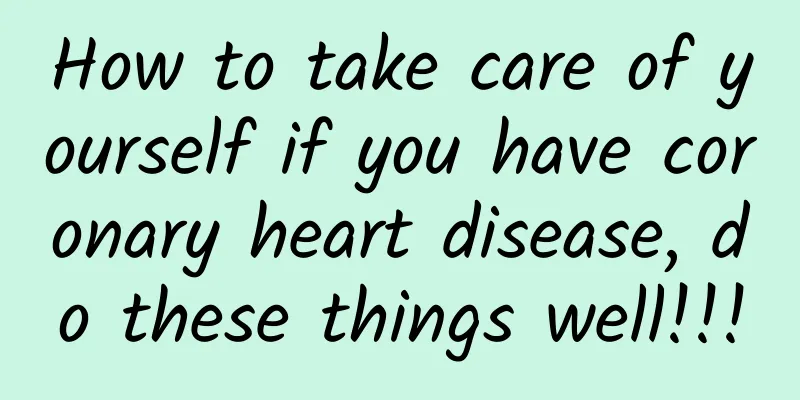How to take care of yourself if you have coronary heart disease, do these things well!!!

|
Coronary heart disease is a cardiovascular disease with a relatively high prevalence in clinical practice. It refers to heart disease caused by coronary atherosclerosis causing narrowing or obstruction of the blood vessel lumen, or myocardial ischemia, hypoxia or necrosis due to changes in coronary artery function. This disease itself is a chronic disease with a relatively long treatment cycle. The onset population is mainly concentrated in the middle-aged and elderly groups, and there is currently a trend of younger people. So what should we do after getting sick? We patients should actively participate in the self-management of the patient's disease. The later disease recovery effect is directly related to whether the patient can accept effective nursing intervention and whether he actively participates in the self-management of the disease. The following article will introduce coronary heart disease nursing methods to patients in detail, hoping to provide auxiliary effects for the recovery of the majority of patients. 1. Symptoms of Coronary Heart Disease Coronary heart disease is mainly caused by a sudden severe chest pain or chest tightness and chest pressure caused by coronary artery stenosis or obstruction. After the onset of the disease, the patient will feel a sense of pressure in the chest, similar to someone stepping on the chest. In addition to the above symptoms, the patient will also show symptoms such as irritability, cold sweats, fear, a sense of impending death, dizziness, dyspnea, nausea, etc. In severe cases, it may also induce arrhythmia, heart failure, cardiogenic shock, etc. The disease has no obvious symptoms in the early stage of onset and is not easy to be discovered by patients. The main symptoms are precordial pain after strenuous exercise or physical labor. With the development of the disease, severe cases can lead to the death of the patient, so it needs to be highly valued. The picture comes from the Internet 2. Causes of coronary heart disease The cause of coronary heart disease is directly related to the occurrence of atherosclerotic lesions in the coronary arteries. In addition, it is related to a variety of factors, such as family history, drinking and smoking, diabetes, hypertension, obesity, etc. These risk factors are closely related to the onset and continued progression of coronary heart disease. Therefore, patients with coronary heart disease need to clearly understand these threatening factors during the treatment process, develop good living habits and eating habits in life, and avoid risk factors. This is of great significance for the recovery of the disease and the recurrence of coronary artery stenosis and blockage, improve the quality of life of patients and prolong their lives, reduce the rate of return to hospital, and reduce mortality and recurrence rates. Among the many factors that induce coronary heart disease, in addition to family history and aging, which are uncontrollable factors, obesity, hypertension, hyperglycemia, unhealthy living and eating habits are all controllable factors. Reasonable intervention in controllable factors of patients with coronary heart disease, such as improving lifestyle, avoiding bad living habits, strengthening self-management and self-care capabilities, following doctor's advice and cooperating with treatment, maintaining a happy mood, and good sleeping habits. A low-salt, low-fat, low-sugar diet, smoking cessation and alcohol restriction can effectively control the development of the disease. 3. Coronary heart disease care methods 3.1 Reasonable diet The recovery of patients with coronary heart disease cannot be separated from dietary intervention. The diet of patients with coronary heart disease should be mainly plant-based, such as vegetables, fruits, cereals, beans, etc., especially vegetables and fruits should be eaten more, which can protect blood vessels and dilute blood. For high cholesterol, high sugar, high fat foods, eat less, such foods will make the blood viscous, will form blood clots in the blood vessels, thus affecting the blood supply to the heart and aggravating the symptoms of coronary heart disease. You can eat some fish, dairy products and nuts appropriately, these foods can provide patients with high-quality protein, calcium and unsaturated fatty acids, which can effectively improve the patient's physical fitness. The picture comes from the Internet 3.2 Psychological care For patients with coronary heart disease, when their emotions fluctuate greatly, their heart rate will speed up, causing an increase in myocardial oxygen consumption, which can cause angina pectoris and even lead to acute myocardial infarction. Therefore, patients with coronary heart disease should reduce the stimulation of external factors on themselves in their daily lives, and at the same time strengthen their own emotional management, and be able to deal with some trivial matters in life calmly, not too nervous, not angry, etc. At the same time, the patient's family members should also comfort the patient's psychological emotions, promote the patient to face life with a positive and optimistic attitude, and encourage the patient to listen to more music, participate in activities, take deep breaths, etc. to divert attention and release the negative emotions and pressure in the heart. 3.3 Environmental care Creating a good home environment for patients can effectively improve their mental state, make them feel happy, and prevent diseases such as respiratory infections. Clean and ventilate the room every day, add or remove clothes appropriately according to weather changes, avoid colds and respiratory infections, and avoid risk factors for worsening coronary heart disease. 3.4 Drug care Medication is the key to the treatment of coronary heart disease. Patients with coronary heart disease need to have nitroglycerin tablets and other drugs at home and when traveling. Take them immediately when angina occurs (be sure to measure blood pressure before taking the medicine), and quickly inhale oxygen when conditions permit. It helps to improve myocardial hypoxia and ischemia, and can inhibit the progression of the disease. In daily life, we must strengthen medication management, follow the doctor's orders, ensure that you do not miss doses, do not change or stop medication without authorization, etc. After taking the medicine, we must clarify whether the medicine has adverse reactions and the improvement of symptoms after taking the medicine, and keep records. At the next visit, you can explain the medication and condition in detail to the doctor, and the doctor can make reasonable adjustments to the drug treatment plan based on the patient's complaints. The picture comes from the Internet 3.5 Daily care 3.5.1 Ensure adequate sleep Insufficient sleep quality will affect the patient's mood and appetite, which in turn directly affects the condition. In this case, the patient can take an appropriate nap, ensuring that the nap time is about 1 hour. Do not sleep too much, avoid insomnia at night, and do not stay up late at night. 3.5.2 Quit smoking and limit alcohol consumption Cigarettes contain nicotine, tar, etc. Long-term smoking can lead to a variety of diseases. Nicotine can cause blood viscosity and abnormal changes in blood vessels. Drinking a lot of alcohol can not only cause alcohol poisoning, but also may cause high blood lipids and heart disease. Excessive ethanol can also increase the oxygen content of the heart and aggravate the symptoms of coronary heart disease. According to the "Dietary Guidelines for Chinese Residents", the daily alcohol intake for men should not exceed 25g, and for women should not exceed 15g. The picture comes from the Internet 3.5.3 Avoid heat and cold In hot seasons, do not stay in this environment for a long time, as it will increase the blood flow in the body and increase the heart load. In cold seasons, pay attention to keeping your hands, feet and head warm, because cold weather will lead to insufficient blood supply to the heart, which will accelerate the heartbeat and increase blood pressure. 3.5.4 Maintain a positive attitude Patients with coronary heart disease should avoid excessive mood swings and should not get angry or upset, as this will aggravate their stress response, cause abnormal contraction of small arteries, rapid heartbeat and high blood pressure, which will lead to ischemia and hypoxia in patients with coronary heart disease and ultimately lead to angina pectoris and myocardial infarction. 3.6 Sports care Patients can better enhance their physical fitness, lower blood pressure and blood sugar levels by doing moderate exercise, which plays an important role in the recovery of coronary heart disease. Before exercising, patients can choose their favorite sports, such as jogging, swimming, gymnastics, etc. The intensity of exercise should be determined according to the patient's actual physical condition. Exercise can be done one hour after a meal. The picture comes from the Internet Presumably, after the above introduction, the majority of coronary heart disease patients have had a preliminary understanding of nursing methods, and are reminded that in addition to actively cooperating with doctors in disease treatment, daily care should not be neglected. Only when nursing work is in place can the disease recovery effect be maximized. |
>>: Management of hyperlipidemia after stroke
Recommend
Female facial meridians
The human meridian and acupoints are a subject wo...
Why haven't I had my period for more than 40 days?
Menstruation is a problem that every mature woman...
What are the symptoms of acute pelvic inflammation?
We all know that no matter whether the illness is...
What are the ways for women to nourish their kidneys?
Kidney tonification has become a very popular top...
What to do if you have backache and stomach pain in early pregnancy
There will be many uncomfortable symptoms during ...
How long does it take to tell if you have twins?
Because in the early stages of pregnancy, the dia...
How to detect vascular age
People age, and blood vessels age, just like tree...
Infection of Hepatitis B in children through breastfeeding
Hepatitis B is highly contagious and can be trans...
What does uterine height mean during prenatal checkup?
Pregnancy check-up is an examination that every p...
Experts from West China University of Political Science and Law said: There is a kind of burn that is not so "hot", but it is just as painful!
Heating equipment and supplies do bring a lot of ...
Can I eat chicken offal during menstruation?
We may seldom eat chicken offal in our daily life...
Prenatal check-up items and costs
Pre-pregnancy check-up refers to a physical exami...
How to judge whether the body is cold or hot
After many people go to a traditional Chinese med...
What are the precautions after vaginal ultrasound?
It is best not to have sexual intercourse before ...
Picture of the position of the cervix and uterus
The Creator created "women" and gave th...









